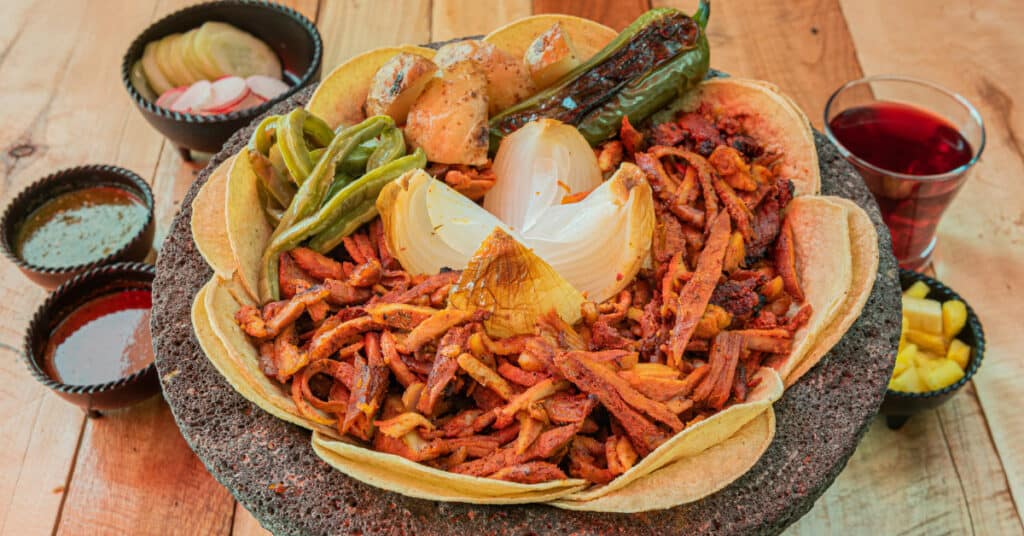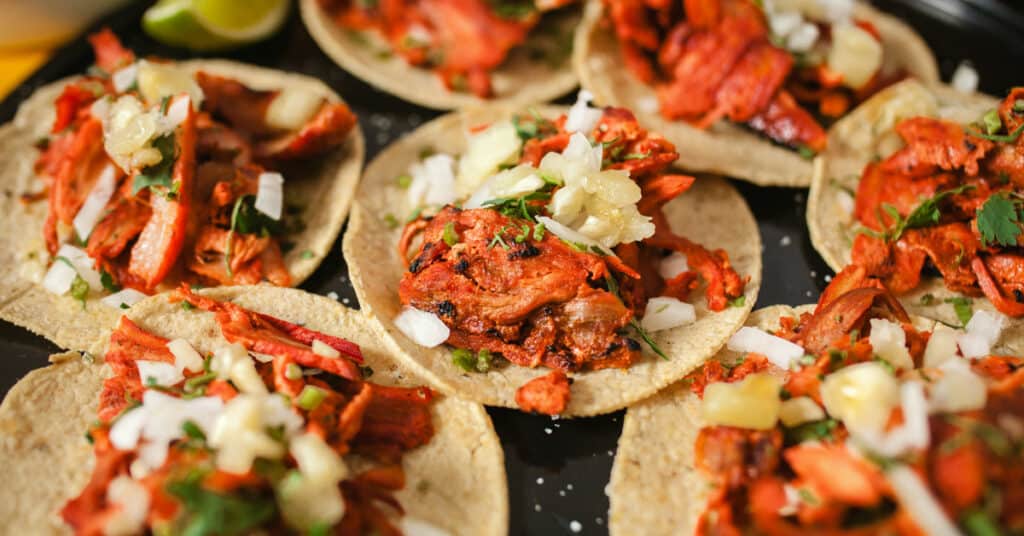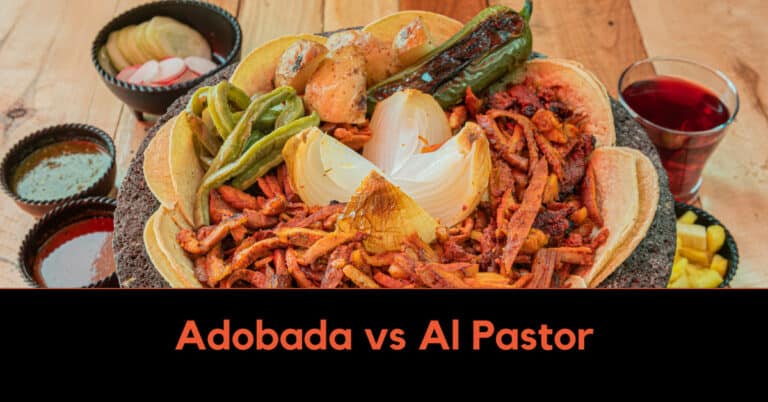**SUMMARY:** Adobada and al pastor are both delicious Mexican dishes, but they have some key differences. Adobada consists of marinated pork cooked on a grill. At the same time, al pastor is typically made with marinated pork cooked on a vertical spit. The flavors and preparation methods vary, making both options unique and worth trying for any fan of Mexican cuisine.
Are you perplexed by the differences between adobada and al pastor?
Confused no more! This article will delve into the rich flavors and unique characteristics of these two mouthwatering Mexican dishes, shedding light on their origins, ingredients, and cooking techniques. Get ready to tantalize your taste buds and gain a comprehensive understanding of the adobada vs. al pastor debate.
Stay tuned as we explore the following subtopics:
- Explaining Adobada
- The Story Behind Al Pastor
- Adobada vs Al Pastor: Similarities and Differences
- Exploring the Adobada vs Al Pastor Debate
Let’s begin a flavorful journey, satisfying your curiosity and culinary cravings.
Explaining Adobada

Adobada, a beloved Mexican dish, is a culinary delight that originates in the state of Baja California. Bursting with flavors and aromas, adobada offers a compelling journey for your taste buds. Let’s uncover the secrets behind this mouthwatering delight:
Origins and Influences
- Adobada has its roots in marinating and grilling meats, traced back to centuries-old cooking traditions in Mexico.
- Influenced by Spanish colonization, adobada incorporates elements of Spanish cuisine, such as the technique of marinating meat in spices.
Ingredients and Preparation
- Adobada is typically made using thinly sliced pork, marinated in a rich blend of spices to infuse it with various flavors.
- The marinade often includes ingredients like dried chilies, garlic, vinegar, achiote paste, oregano, and various spices, resulting in a vibrant and complex flavor profile.
- The marinated pork is traditionally cooked on a grill or a skewer, intensifying the flavors while creating a mouthwatering charred exterior.
Flavors and Characteristics
- Adobada boasts a harmonious balance of smoky, tangy, and slightly spicy notes that dance on your palate.
- The slow marinating process ensures that the flavors penetrate deeply into the meat, resulting in tender, succulent bites.
- With each juicy mouthful, you may savor the rich combination of spices, the vinegar’s slight tanginess, and the dried chilies’ earthy undertones.
Prepare your taste buds for an irresistible adventure, as we now turn our attention to the story behind al pastor in the next section.
The Story Behind Al Pastor

Al pastor, a popular Mexican dish, has a fascinating history and cultural influence. It is believed to have originated from the culinary traditions of Lebanese immigrants who settled in Mexico during the early 20th century. These immigrants brought their love for shawarma, a dish made of marinated spit-roasted meat.
Origins and Cultural Influences:
- In the 1930s, the method of cooking shawarma was adapted by Mexican chefs, who substituted the traditional lamb with pork due to its availability.
- The dish quickly gained popularity in Mexico City, particularly in the neighborhood of Colonia Guerrero, which had a significant Lebanese population.
- Over time, the preparation and presentation of the dish evolved, resulting in the creation of al pastor as a distinct Mexican interpretation of shawarma.
- Al pastor became ingrained in the Mexican street food scene and remains an iconic representation of the cultural fusion between Lebanese and Mexican cuisines.
Unique Ingredients and Cooking Techniques:
- Unlike adobada, al pastor is marinated using a distinctive combination of spices and ingredients, giving it its signature flavor.
- The marinade typically includes a blend of various spices such as achiote, garlic, cumin, oregano, and citrus juice, among others.
- Traditionally, the marinated pork is stacked onto a vertical rotisserie called a “trompo,” which resembles the Middle Eastern shawarma spit.
- As the trompo rotates slowly, the outer layer of the marinated meat cooks, while succulent layers of meat are gradually shaved off for serving.
Flavor Profile and Distinctions from Adobada:
- Al pastor has a unique and distinctly Mexican flavor profile. The combination of spices, citrus, and slow cooking over an open flame imparts the meat a smoky and slightly sweet taste.
- It differs from adobada in that the achiote-based marinade and cooking technique lend al pastor a more tangy and vibrant flavor.
- Adobada, on the other hand, tends to have a bolder flavor profile with the dominant taste of chili peppers and vinegar.
- The cooking method used for al pastor, with the meat being roasted and shaved from a rotating spit, also contributes to its distinctive texture and tenderness.
Adobada vs Al Pastor: Similarities and Differences
When comparing adobada and al pastor, it’s important to recognize the similarities and differences between these two popular Mexican dishes. While both are pork-based and feature flavorful marinades, they have distinct characteristics and regional preferences.
Similarities
- Pork as the main ingredient: Both adobada and al pastor utilize pork as the primary protein, although the specific cuts used may vary.
- Marinades: Both dishes involve marinating the pork in a flavorful mixture of spices, herbs, and other ingredients to enhance the taste.
- Bold flavors: Adobada and al pastor are known for their robust and vibrant flavor profiles, with various spices and seasonings infusing the meat.
Differences
Ingredients
- Adobada:
- The marinade for adobada typically consists of a combination of dried red chili peppers, vinegar, garlic, oregano, and other spices.
- The use of red chili peppers contributes to the dish’s deep red color and adds a characteristic kick of heat.
- Al pastor:
- Al pastor marinades often include achiote paste, a blend of spices like cumin and oregano, onion, garlic, citrus juice, and pineapple.
- Achiote paste gives al pastor its distinctive orange hue, while pineapple helps tenderize the meat and adds a subtle sweetness.
Cooking Methods
- Adobada:
- Adobada is commonly prepared by slow-cooking the marinated pork in an oven or stovetop until it becomes tender.
- Al pastor:
- Al pastor is traditionally cooked on a vertical rotisserie called a “trompo,” where the marinated pork is stacked and grilled.
- As the trompo rotates, the outer layers of the meat cook while flavorful and succulent pieces are shaved off for serving.
Regional Variations
- Adobada:
- Adobada is popular across different regions of Mexico, with variations in marinades and seasonings based on local preferences.
- In certain regions, such as Baja California, adobada is often served as tacos enveloped in warm tortillas.
- Al pastor:
- Al pastor is especially beloved in central and southern Mexico, particularly in Mexico City and the Yucatan Peninsula.
- In Mexico City, the famous “taco al pastor” is traditionally served with thinly sliced meat, diced pineapple, and garnishes like onion, cilantro, and salsa.
As a lover of Mexican cuisine, I appreciate the unique characteristics of both adobada and al pastor. The bold and fiery flavors of adobada have a special place in my heart. At the same time, al pastor’s tangy and aromatic taste never fails to delight my taste buds. It’s difficult to choose between the two because they each offer their own distinct experience. Ultimately, the choice depends on personal preferences and the regional variations available.

Exploring the Adobada vs Al Pastor Debate
The debate between adobada and al pastor has sparked discussions and arguments among food enthusiasts and Mexican cuisine aficionados. Each dish has its loyal following, and the discussion often centers around which one is superior or more authentic. Let’s delve deeper into the exploration of this intriguing debate.
Cultural Significance and Popularity
- Adobada:
- Adobada holds a place of pride in Mexican culinary traditions, with its roots traceable to indigenous and Spanish influences.
- It is recognized as a historic dish that has been enjoyed for generations, embodying the rich heritage of Mexican cuisine.
- Al pastor:
- Al pastor, with its origins in Lebanese cuisine and its fusion with Mexican flavors, reflects Mexico’s cultural diversity and culinary evolution.
- Its popularity, especially among street food enthusiasts, has solidified its status as a quintessential Mexican dish.
Arguments from Different Perspectives
- Flavor vs Heat:
- Proponents of adobada argue that its intense flavors, derived from the combination of chili peppers and vinegar, make it more satisfying and robust.
- Supporters of al pastor emphasize the balance of flavors obtained from the marinade’s blend of spices, achiote, and pineapple, arguing that it offers a more well-rounded taste.
- Tradition vs Innovation:
- Adobada enthusiasts often emphasize the historical significance and heritage associated with the dish, considering it a representation of traditional Mexican culinary practices.
- Al pastor advocates appreciate the innovative adaptation of Middle Eastern shawarma, celebrating the cultural fusion and evolution of Mexico’s gastronomic landscape.
- Regional Preferences:
- The debate also extends to regional preferences, as different parts of Mexico have distinct culinary traditions.
- Some regions may have a stronger affinity for either adobada or al pastor, influenced by local ingredients and cultural heritage.
Examples of Debates and Discussions
- Online Forums and Social Media:
- Platforms such as Reddit, food-related forums, and social media groups often host passionate discussions, where individuals share their opinions, experiences, and favorite places to find exceptional adobada or al pastor.
- Culinary Events and Contests:
- Food festivals and competitions provide platforms for chefs and culinary enthusiasts to showcase their skills in preparing adobada and al pastor, inviting debates and evaluations of the dishes.
- Personal Preferences:
- Conversations among friends and family often turn into lively debates where personal tastes and experiences shape the opinions on which dish is superior.
Personal Opinions and Recommendations
While the debate between adobada and al pastor may never be settled definitively, it is essential to appreciate both dishes’ distinct qualities and flavors. As a personal recommendation, I encourage readers to try both adobada and al pastor when presented with the opportunity. Each dish offers a unique experience and showcases Mexican cuisine’s culinary diversity and creativity. Ultimately, it comes down to personal taste preferences and exploring different regional variations to determine one’s favorite.
Key Takeaways
In conclusion, the debate between adobada and al pastor is an age-old discussion that continues to spark excitement and ignite taste buds. By exploring these two beloved Mexican dishes, we have uncovered the key similarities and differences and delved into their origins, ingredients, flavors, and cultural significance. Here are the key takeaways from this article:
- Adobada is a marinated pork dish from Spanish cuisine, characterized by its rich, flavorful marinade and slow cooking methods.
- On the other hand, Al pastor has its roots in Lebanese cuisine and is known for its unique vertical spit-roasting technique and distinct blend of spices.
- While both dishes offer a tantalizing combination of flavors, adobada showcases a more robust and complex taste profile. At the same time, al pastor leans towards a savory and slightly tangy flavor.
- The regional variations of adobada and al pastor offer further choices and preferences for enthusiasts of Mexican cuisine.
- The adobada vs al pastor debate is a matter of personal preference, with each dish offering its unique and delicious experience.
We hope this article has shed light on the nuances of adobada and al pastor, enabling you to make informed choices the next time you find yourself amid this delicious debate. Happy exploring and savoring!
Frequently Asked Questions (FAQ)
What is the difference between adobada and al pastor?
Adobada and al pastor are Mexican pork dishes, but they differ in origin, cooking methods, and flavor profiles. Adobada typically consists of marinated pork cooked slowly. At the same time, al pastor is made from pork that is vertically grilled on a spit. Additionally, adobada has a more robust and complex flavor, while al pastor offers a savory and slightly tangy taste.
Can adobada and al pastor be made with other meats besides pork?
Although pork is the most common meat used in both adobada and al pastor, it is possible to adapt the recipes to use other meats. For example, chicken or beef can be marinated and prepared similarly to adobada or al pastor, providing a different flavor experience while retaining the essence of these beloved dishes.
Are adobada and al pastor considered traditional Mexican dishes?
While adobada and al pastor have strong ties to Mexican cuisine, their origins can be traced back to other cultures. Adobada has its roots in Spanish cuisine, while al pastor draws inspiration from Lebanese cooking traditions. However, these dishes have become staples in Mexican gastronomy and are often regarded as traditional Mexican fare.
Does adobada and al pastor have any dietary restrictions?
Adobada and al pastor may not be suitable for individuals following specific dietary restrictions, as both dishes typically contain pork and various seasonings. However, it is possible to modify the recipes to accommodate certain dietary needs, such as using leaner cuts of meat or opting for alternative proteins like chicken or beef. As always, it is essential to consider individual dietary requirements and consult with a healthcare professional if necessary.
Which dish is more popular: adobada or al pastor?
The popularity of adobada and al pastor can vary depending on geographical regions and personal preferences. Both dishes have a strong presence in Mexican cuisine and enjoy widespread popularity. Adobada is particularly prominent in Northern and Baja California. At the same time, al pastor is beloved in central and southern regions of Mexico and has gained international recognition as a street food favorite. Ultimately, it is up to the individual to decide which dish resonates more with their taste buds and culinary preferences.

